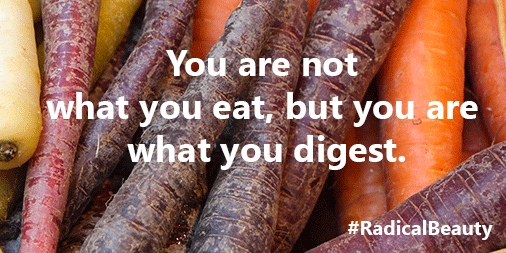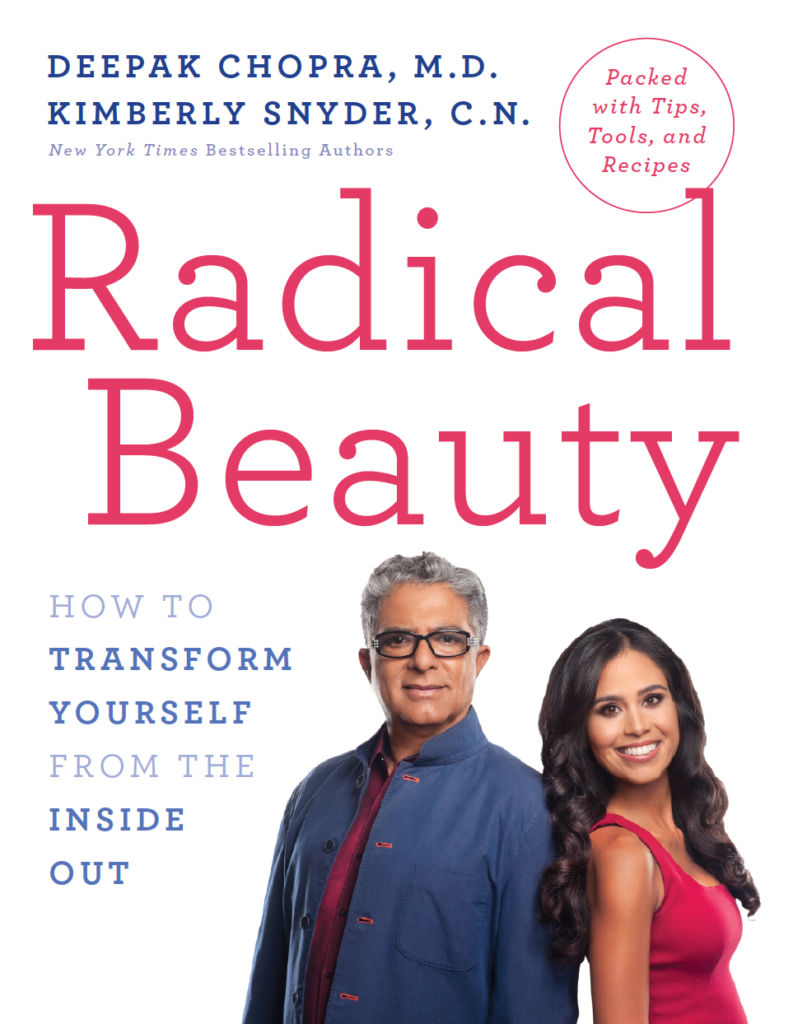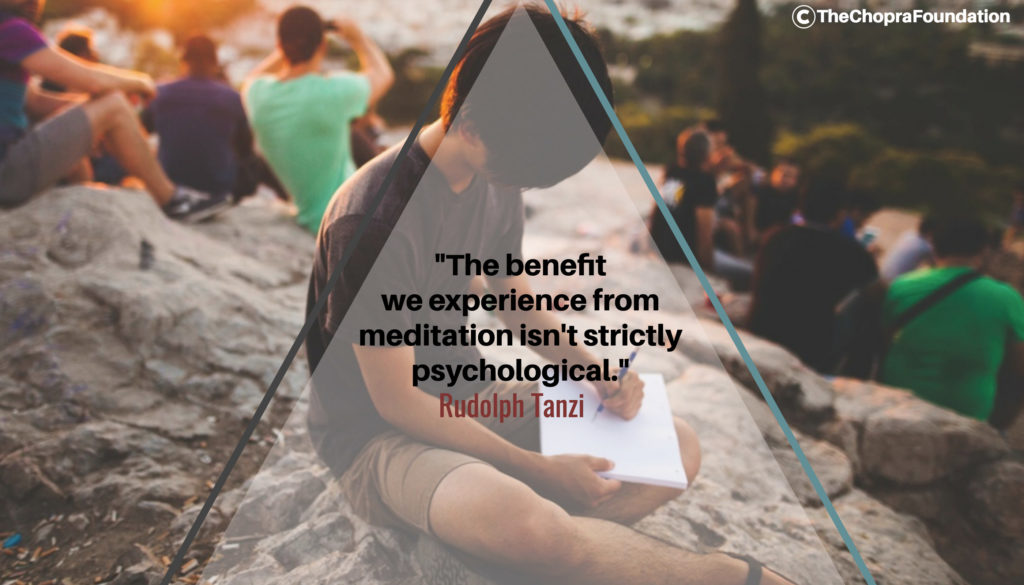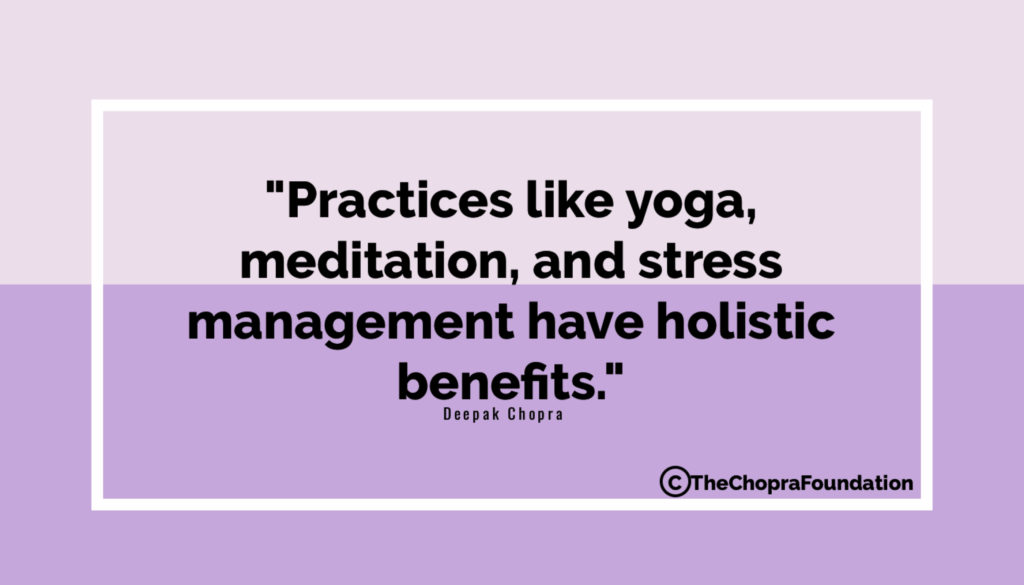
Rustum Roy Spirit Award Recipient, Eric Schadt, interviewed by Reuters. Read: Just Going on Vacation May Change Gene Activity
Source: http://www.nature.com/tp/journal/v6/n8/full/tp2016164a.html

Rustum Roy Spirit Award Recipient, Eric Schadt, interviewed by Reuters. Read: Just Going on Vacation May Change Gene Activity
Source: http://www.nature.com/tp/journal/v6/n8/full/tp2016164a.html

By Deepak Chopra, MD and Kimberly Snyder, CN
The pursuit of beauty, which has been a constant theme throughout recorded history, makes beauty seem like a mysterious gift granted only to the fortunate few. Even now in a scientific age, there’s the constant search for beauty secrets that will bring this gift to many more people. In fact, such a secret does exist, in our view. Instead of saying, “If I’m beautiful I will be happy, the secret is the reverse: “If I’m happy, I will be beautiful.”
This is the axiom of finding beauty from the inside out. There is a rising tide of evidence to show that our cells immediately respond to the inner events in our lives. Being unhappy is a state of mind and body, not simply the mind. There are medical consequences in terms of decreased immune response, for example, among people who are depressed, grief-stricken, lonely, or who have been suddenly terminated from their jobs. This isn’t news. What’s news-worthy is the finer detail, which indicates that no matter how microscopic the scale, all the way down to our genes, shifts in mental activity produce shifts in the wellbeing of cells.
Let’s accept for the moment that the best way to be beautiful is to be happy. Does that really improve the situation? The field of positive psychology, which is relatively new, has discovered that being happy isn’t a simple thing where one prescription works for everyone. And finding a path to increased happiness is tricky. Each of us has a kind of emotional set point we return to as our default. An outside event can cause the needle to move, making us temporarily happier than usual or unhappier. But over time we return to our emotional set point, even after the most extreme events.
Yet happiness is still the key, because two findings from positive psychology appear to be solid. The first is that a happy life is made up from happy days. In other words, waiting to be happy isn’t effective. Being happy today, here and now, is the best strategy. This ties in with the finding that our cells react to our moods. If you work for twenty years at a job that makes you miserable, waiting for retirement day so that you can finally be happy, then during those twenty years you amass cellular changes, including pathways in the brain, that imprint misery–something you will be carrying around biologically and psychologically for many years into your retirement.
What makes for a happy day? In the first post of this series we reduced this question to a matter of input. Our cells recognize only negative input and positive input. Experience is translated into chemicals that either benefit a cell or harm it. Therefore, by focusing on giving the mind-body system positive input every day and decreasing negative input, you are adding to your well-being overall. Here’s a sizable list of positive inputs to pay attention to, as first stated in our last post:
As a practical matter, you can keep a journal that tracks these positive aspects of life, while at the same time tracking the negative aspects, which are simply the opposite of everything on the list. Most of these things are directly under your control, such as deciding to meditate, and others, such as being in a loving relationship, are things you have a voice in.
So choosing to be happy involves meaningful decisions, which brings us to the second discovery about how to be happy. Despite the effects of outside people and forces pulling against your happiness, and despite the emotional set point, it is estimated that 40-50% of a person’s happiness is dependent on choices made or not made. This is simply an average. It’s likely that some people grow much happier than the norm once they make steady, conscious, positive choices. We already know that such people have much better physical health than the norm, so it’s only logical that the same applies to wellbeing. In our view, “If I’m happy, I will be beautiful” is the beauty secret everyone has dreamed of.
Deepak Chopra MD, FACP, founder of The Chopra Foundation and co-founder of The Chopra Center for Wellbeing, is a world-renowned pioneer in integrative medicine and personal transformation, and is Board Certified in Internal Medicine, Endocrinology and Metabolism. He is a Fellow of the American College of Physicians and a member of the American Association of Clinical Endocrinologists. The World Post and The Huffington Post global internet survey ranked Chopra #17 influential thinker in the world and #1 in Medicine. Chopra is the author of more than 80 books translated into over 43 languages, including numerous New York Times bestsellers. His latest books are Super Genes co-authored with Rudolph Tanzi, PhD and Quantum Healing (Revised and Updated): Exploring the Frontiers of Mind/Body Medicine. www.deepakchopra.com
KIMBERLY SNYDER, C.N., is a nutritionist and the New York Times bestselling author of the Beauty Detox book series. Snyder has appeared as a nutrition and beauty expert on Good Morning America, Dr. Oz, Ellen, Access Hollywood, The Doctors, and Today and has been featured in the New York Times, the Wall Street Journal, Vogue, Vanity Fair, Elle, InStyle, as well as many others. The go-to nutritionist for many of the entertainment industry’s top performers, Snyder is also the creator of Glow Bio, an organic juice, smoothie and cleanse company. She hosts the top-rated podcast Beauty Inside Out on iTunes, and her blog, website, and products have spread the Beauty Detox movement to more than 150 countries. For more information, visit KimberlySnyder.com and RadicalBeauty.com.

Six-Day Clinical Trial Finds Integrative Medicine Program Alters Blood Serum
Meditation, yoga and vegetarian diet linked to decline in plasma metabolites associated with inflammation and cardiovascular disease risk

In a novel controlled clinical trial, participants in a six-day Ayurvedic-based well-being program that featured a vegetarian diet, meditation, yoga and massages experienced measurable decreases in a set of blood-based metabolites associated with inflammation, cardiovascular disease risk and cholesterol regulation.
View the Study: Integrative Medicine Program Alters Blood Serum
The findings, published in the September 9 issue of Scientific Reports, represent a rare attempt to use metabolic biomarkers to assess the reported health benefits of integrative medicine and holistic practices. Senior author of the study, which included researchers from multiple institutions, was Deepak Chopra, MD, clinical professor in the Department of Family Medicine and Public Health at University of California San Diego School of Medicine and a noted proponent of integrative medicine.
“It appears that a one-week Panchakarma-based program can significantly alter the metabolic profile of the person undergoing it,” said Chopra, whose foundation provided and managed funding for the study. “As part of our strategy to create a framework for whole systems biology research, our next step will be to correlate these changes with both gene expression and psychological health.”
Study co-author Paul J. Mills, PhD, professor of family medicine and public health and director of the Center of Excellence for Research and Training in Integrative Health, both at UC San Diego, noted that alternative and integrative medicine practices, such as meditation and Ayurveda, are extremely popular, but their effects on the human microbiome, genome and physiology are not fully understood. “Our program of research is dedicated to addressing these gaps in the literature.”
We looked at the effects of a Panchakarma-based Ayurvedic intervention on plasma metabolites in a controlled clinical trial,” said lead author Christine Tara Peterson, PhD, a postdoctoral fellow at UC San Diego. Panchakarma refers to a detoxification and rejuvenation protocol involving massage, herbal therapy and other procedures to help strengthen and rejuvenate the body.”
The study involved 119 healthy male and female participants between 30 and 80 years of age who stayed at the Chopra Center for Wellbeing in Carlsbad, Calif. Slightly more than half were assigned to the Panchakarma intervention (the Chopra Center’s Perfect Health program, which prices start at $2865 for a six-day treatment). The remainder to a relaxation control group. Blood plasma analyses, using liquid chromatography and mass spectrometry, were taken before and after the six-day testing period.
The researchers found that in the Panchakarma group there was a measurable decrease in 12 specific cell-membrane chemicals (phosphatidylcholines) correlating with serum cholesterol and inversely related to Type 2 diabetes risk.
“These phospholipids exert broad effects on pathways related to inflammation and cholesterol metabolism,” said Peterson. “Plasma and serum levels of the metabolites of phosphatidylcholine are highly predictive of cardiovascular disease risk.”
Application of a less stringent measurement standard identified 57 additional metabolites differentially abundant between the two groups of participants, which included additional phosphatidylcholines, sphingomyelins, and others. The authors suggested that given the very short duration of the trial, the serum profile changes were likely driven by the vegetarian diet component of Panchakarma. They said further studies were needed to more fully understand the processes and mechanisms involved.
Co-authors include Arthur M. Moseley, Joseph Lucas, Lisa St John Williams and P. Murali Doraiswamy, Duke University; Elizabeth H. Blackburn and Elissa E. Epel, UC San Francisco; Sheila Patel and Valencia Porter, UC San Diego and The Chopra Center for Wellbeing; Scott N. Peterson, Sanford Burnham Prebys Medical Discovery Institute; Eric E. Schadt, Steven R. Steinhubl and Eric J. Topol, Scripps Translational Science Institute; and Rudolph E. Tanzi, Harvard University.
Funding for this research came, in part, from the Fred Foundation, the MCJ Amelior Foundation, the National Philanthropic Trust, the Walton Family Foundation, the Chopra Foundation and Sybil Robson Orr.
Disclosures: Deepak Chopra is founder of the Chopra Foundation and co-founder of the Chopra Center for Wellbeing. Paul Mills is director of research at the Chopra Foundation.
Full study: Peterson, C. T. et al. Identification of Altered Metabolomic Profiles Following a Panchakarma-based Ayurvedic Intervention in Healthy Subjects. Sci. Rep. 6, 32609; doi: 10.1038/srep32609 (2016).
By Deepak Chopra, MD and Kimberly Snyder, CN
Society has allowed our notion of beauty to go awry. Countless women–and not just women–look in the mirror and see a reflection of inadequacy. They have fallen short of an ideal that was defective to begin with. But conditioned since childhood to equate a “perfect” body with being beautiful, they blame themselves for being the defective one.
The situation is filled with cruel ironies. Children are naturally beautiful until they are taught to stop thinking that way and to start measuring themselves by an unnatural standard. Even the small percentage of women who are super-model thin suffer anxiety over gaining a pound. The first gray hair and wrinkles create panic. The worship of perfection belies the epidemic of obesity that constitutes reality for millions.
The problem has been diagnosed many times without a workable solution. One study after another has proven without a doubt that fad diets don’t work; in fact, the chances of becoming obese are higher for chronic dieters. Billions of dollars spent on cosmetics and plastic surgery have done nothing to solve a prevailing sense of not being beautiful enough. All of this points to a single underlying issue: a woman’s sense of lack.
In our view, this is the issue that must be addressed head on. If a person looks in the mirror and doesn’t see someone who is lacking, the way is open for seeing someone who is beautiful. A radical turn-around in social measures of beauty is necessary, and yet the good news is that such a turn-around is accessible by everyone. Let’s look at a few facts about the mind-body system that support our optimism. 
1. Mind and body are connected through a network of messaging that alerts every cell in the body to our thoughts, moods, beliefs, hopes, fears, and expectations.
2. As a result, the body is amazingly sensitive to shifts in our mental state.
3. By using a simple measure–the percentage of positive input the mind-body system receives–the messaging to every cell can be improved and even optimized.
4. Working from the inside out, practices like yoga, meditation, and stress management have holistic benefits.
These facts have far-reaching implications for beauty. As a woman gains more positivity about herself, grounded in lifestyle changes in any area, the feedback loop that connects mind and body gets stronger. The person’s increased wellbeing increases, and with each step in this direction, a shift occurs in the brain, favoring even more positivity and less negativity. So what do we mean by positive input? In our holistic approach to beauty, which we call Radical Beauty, the range of possibilities is very broad:
* Pure food, water, and air.
* Avoiding physical and emotional toxins.
* Unprocessed, natural, organic food.
* Nurturing relationships.
* Good sleep.
* Exercise that favors lightness, balance, flexibility, and gracefulness.
* Attitudes of appreciation and gratitude.
* A higher vision of life.
* Service to others.
* Satisfying, meaningful work.
* Mediation and yoga.
* Increased self-esteem.
* The sense of being in control.
* Feeling safe.
* Feeling as if you belong.
* Daily close contact with family and friends.
* Generosity of self through acts of giving.
* Being loved and loving in return.
This is just a start on the holistic path, and every aspect comes naturally once we drop our unrealistic ideals and realize how fulfilling reality can be instead. Beauty should be measured by these things, and yet we aren’t shying away from or giving up on traditional beauty, which still has a place. The skin, for example, is the body’s largest organ and secrets more endocrine hormones than the endocrine glands. These hormones are carriers and signals of emotion. therefore, in the mind-body feedback loop, a glowing mood gets translated into glowing skin.
In the next post we’ll give more details about how our radical revision of beauty works, in what we call Radical Beauty. Here we wanted to open the discussion on a topic that everyone is involved in, leading to life-enhancing or self-destructive results. The purpose of beauty should always be life-enhancing, and we believe it can be, in very practical terms.
Deepak Chopra MD, FACP, founder of The Chopra Foundation and co-founder of The Chopra Center for Wellbeing, is a world-renowned pioneer in integrative medicine and personal transformation, and is Board Certified in Internal Medicine, Endocrinology and Metabolism. He is a Fellow of the American College of Physicians and a member of the American Association of Clinical Endocrinologists. The World Post and The Huffington Post global internet survey ranked Chopra #17 influential thinker in the world and #1 in Medicine. Chopra is the author of more than 80 books translated into over 43 languages, including numerous New York Times bestsellers. His latest books are Super Genes co-authored with Rudolph Tanzi, PhD and Quantum Healing (Revised and Updated): Exploring the Frontiers of Mind/Body Medicine. www.deepakchopra.com
KIMBERLY SNYDER, C.N., is a nutritionist and the New York Times bestselling author of the Beauty Detox book series. Snyder has appeared as a nutrition and beauty expert on Good Morning America, Dr. Oz, Ellen, Access Hollywood, The Doctors, and Today and has been featured in the New York Times, the Wall Street Journal, Vogue, Vanity Fair, Elle, InStyle, as well as many others. The go-to nutritionist for many of the entertainment industry’s top performers, Snyder is also the creator of Glow Bio, an organic juice, smoothie and cleanse company. She hosts the top-rated podcast Beauty Inside Out on iTunes, and her blog, website, and products have spread the Beauty Detox movement to more than 150 countries. For more information, visit KimberlySnyder.com and RadicalBeauty.com.

By Deepak Chopra, MD and Rudolph E. Tanzi, PhD
This week some exciting news has come out about the effect of meditation on personal wellbeing. Adding to the mounting evidence that meditation has a number of beneficial effects on things like blood pressure and depression, what’s crucial in the new study, which just appeared in Springer Nature’s journal Translational Psychiatry, is that meditation actually causes changes at the deepest level, in our genes. The study was top level, involving scientists from the Icahn School of Medicine at Mount Sinai, the University of California, San Francisco, and Harvard Medical School. Before detailing the research, let us paint the broader picture, because that’s where the real breakthrough is occurring.
Potentially the most fruitful discovery in medical science over the past two decades has been occurring at the genetic level. The standard view, ever since the mapping of DNA in the early 1950s, was that our genes are fixed and unchanging. Whatever the 20,000-25,000 genes we inherited from our parents at birth, these remain permanently with us throughout life. That part hasn’t changed. No one gains or loses a gene after conception. So how could the picture change?
Leaving aside random mutations (the cause of cancer in a cell), the fixed nature of our genes cuts off any chance of evolving after we are born. Evolution is a slow process involving millions of years of random mutations coupled with selective pressures. Most mutations die out quickly because they adversely affect our fitness, or they are randomly fixed because they are neutral (offer no benefit but also cause no harm). But there’s another side of the story, known as gene expression, i.e. the activity of the genes. DNA turns out to be incredibly dynamic and responsive to a person’s lifestyle. Genes regulate every chemical reaction inside a cell, and as a result, thousands of variations in gene activity are possible. You can think of genetic switches operating like rheostats rather than on-off switches. Or there’s an alternative image of a jukebox sitting in the corner. The jukebox is fixed in place, yet it can play many records, and each record contains a different message.
The big question, then, is how to get cells to send and receive the most positive messages. “Positive” means a response that enhances the life of a cell, which is how the life of tissues and organs improves, and from there the life of the individual. It would be tremendous if a person can make choices that lead immediately and directly to enhancing bodily functions from the genetic level. In fact, this is what the new study confirms. We quote directly from the press release from Mt. Sinai in New York:
The study involved 94 healthy women, aged 30-60. Sixty-four women were recruited who were not regular meditators. Participants stayed at the same [La Costa} resort in [Carlsbad] California for six days, and randomized so that half were simply on vacation while the other half joined a meditation training program run by the Chopra Center for Wellbeing. The meditation program included training in mantra meditation, yoga, and self-reflection exercises. It was designed by Deepak Chopra, MD, who did not participate in data collection or analysis.
For greater insight into the long-term effects of what scientists dubbed the ‘meditation effect’ compared to the “vacation effect,” the team also studied a group of 30 experienced meditators who were already enrolled in the retreat that week. Researchers collected blood samples, and surveys, from all participants immediately before and after their stay, as well as surveys one month and ten months later.
The research team examined the changes in 20,000 genes to determine which types of genes were changing before and after the resort experience. Scientists performed an integrative transcriptomic analysis, comparing gene expression networks across all three groups of participants and finding unique molecular profiles and pathway enrichment patterns. Study results show that all groups — novice meditators, experienced meditators, and vacationers — had significant changes in molecular network patterns after the week at the resort, with a clear signature distinguishing baseline from post-vacation biology. The most notable changes in gene activity were related to stress response and immune function.
Researchers assessed self-reported measures of wellbeing. While all groups showed improvements up to one month later, the novice meditators had fewer symptoms of depression and less stress much longer than the non-meditating vacationers. The psychological effects appear to be enduring and it is unknown how much of this longer lasting benefit may be due to continued practice or lasting changes in how people view events in their lives.
“It’s intuitive that taking a vacation reduces biological processes related to stress, but it was still impressive to see the large changes in gene expression from being away from the busy pace of life, in a relaxing environment, in such a short period of time,” said Elissa S. Epel, PhD, Professor of Psychiatry at University of California, San Francisco and first author of the study.
Although the findings will need to be replicated, this study, which agrees with similar findings about meditation and gene expression, is likely to be far reaching. It is safe to say that meditation is an ideal way to engage in restorative activities that may provide relief for our immune systems, easing the day-to-day stress of a body constantly trying to protect itself. The prediction is that this would also lead to healthier aging.
As promising as that is, the prospect that should excite everyone is that we can self-direct our own biology. Meditation is only one avenue; diet, exercise, stress managements, psychotherapy, and various contemplative practices, Eastern and Western, are beginning to dawn as changers of genetic expression. In other words, your cells are eavesdropping on every part of your lifestyle, responding to what you think, do, and feel. Suddenly there is no longer a gap between mind and body. We have genetic proof that the two are merged into one system, and a “whole system” approach should be taken if we want to thrive throughout a lifetime.
Deepak Chopra MD, FACP, founder of The Chopra Foundation and co-founder of The Chopra Center for Wellbeing, is a world-renowned pioneer in integrative medicine and personal transformation, and is Board Certified in Internal Medicine, Endocrinology and Metabolism. He is a Fellow of the American College of Physicians and a member of the American Association of Clinical Endocrinologists. The World Post and The Huffington Post global internet survey ranked Chopra #17 influential thinker in the world and #1 in Medicine. Chopra is the author of more than 80 books translated into over 43 languages, including numerous New York Times bestsellers. His latest books are Super Genes co-authored with Rudolph Tanzi, PhD and Quantum Healing (Revised and Updated): Exploring the Frontiers of Mind/Body Medicine. www.deepakchopra.com
Dr. Rudolph Tanzi is the Director of the Genetics and Aging Research Unit and Vice-Chair of Neurology at Massachusetts General Hospital. He is also the Joseph P. and Rose F. Kennedy Professor of Neurology at Harvard Medical School. Dr. Tanzi discovered several Alzheimer’s disease (AD) genes and directs the Alzheimer’s Genome Project. He is now actively developing therapies for treating AD based on knowledge gained from genetics and lifestyle interventions. Dr. Tanzi has published over 475 papers and has received the Metropolitan Life Foundation Award, Potamkin Prize, the Smithsonian American Ingenuity Award, and was on the 2015 TIME100 Most Influential People in the World list. He also co-authored the New York Times Bestseller, “Super Brain” and “Super Genes” with Dr. Deepak Chopra.